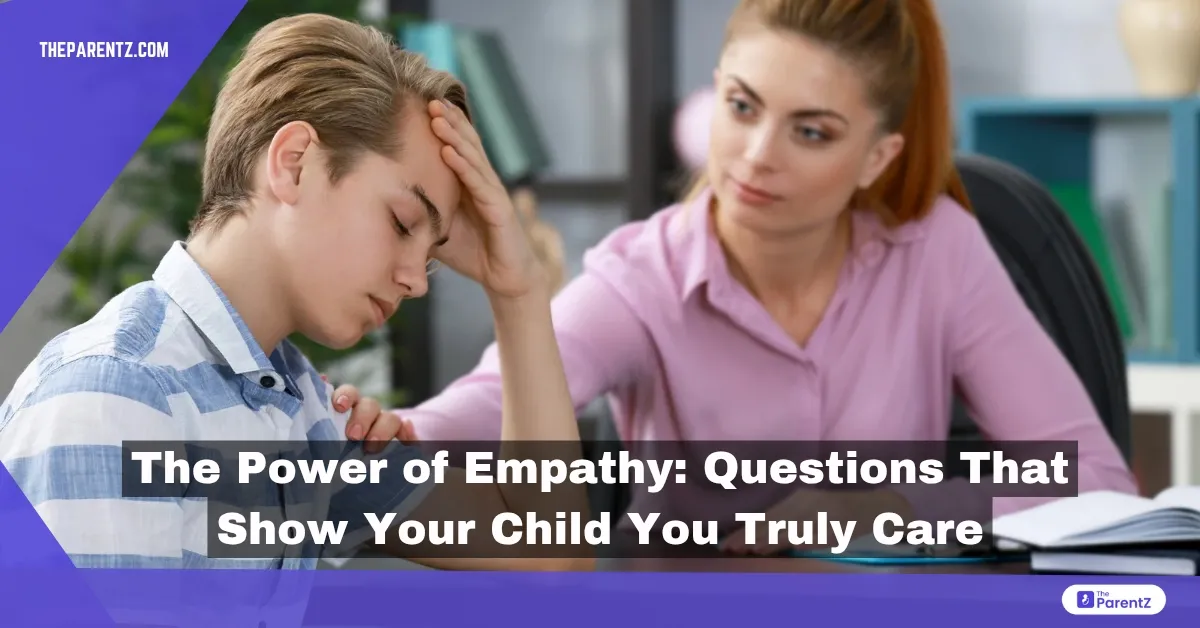"Mom, you just don't understand!"
"Dad, you never listen to me!"
Sound familiar? As parents, we've all experienced those moments when connection seems impossible and our children feel worlds away. The truth is, our kids desperately need to know we care about them—even when they push us away, even when they don't fully understand their own emotions, and especially when they struggle to put their needs into words.
In the chaos of daily life, it's easy to fall into patterns of surface-level communication: "How was school?" "Fine." "Do your homework." "OK." But beneath these brief exchanges, our children yearn for a deeper connection—for evidence that we truly see them, hear them, and value their inner experiences.
What if the most powerful way to show our children we care isn't through grand gestures or long lectures but through thoughtfully asked questions that open doors to their hearts and minds? Questions that feel like a warm embrace, even when physical hugs are rejected, or simply not enough to address the complex emotions our children face as they grow.
Why These Questions Matter
Kids need connection. They need to feel seen and heard. When we ask thoughtful questions, we’re not just starting a conversation—we’re showing them that their voice matters, that their feelings are important, and that we care about their world.
These questions can do so much:
- They help your child open up when they’re struggling to express themselves.
- They build trust and strengthen your relationship.
- They teach your child that it’s okay to share their feelings without fear of judgment or rejection.
Most importantly, these questions remind your child that they are loved—not just in the big moments but in the small ones, too.
Questions That Feel Like a Hug
Here are questions that open doors to deeper connection with your child, letting them know you're truly present and care about what's happening in their inner world:
1. “I can see this is really important to you. Do you need a little more time to work through it?”
When your child is upset or focused on something that matters to them—whether it’s finishing a drawing or calming down after a tantrum—this question shows patience and understanding. It tells them: “I see you’re feeling something big right now, and I’m here for you.”
2. “Would you like me to stay with you for a bit longer?”
Whether it’s bedtime or after a tough day at school, sometimes kids just need reassurance that you’re there for them. Asking this question lets them know it’s okay to ask for comfort—and that you’re willing to give it.
3. “Do you want advice or just someone to listen?”
Sometimes kids don’t want solutions—they just want someone who will listen without interrupting or fixing things. This question gives them the freedom to share what’s on their mind in the way they need.
4. “Can you tell me what’s making you feel this way??”
This question invites your child to explore their emotions and helps them feel understood. It shows genuine curiosity about their inner world and reminds them that their feelings are valid.
5. “What is your side of the story?”
When conflicts arise—whether it’s sibling fights or disagreements with friends—this question lets your child share their perspective without fear of blame or judgment.
6. “How can I love you better?”
This question is deeply powerful because it invites your child to tell you what they need directly. It shows humility and a willingness to grow as a parent.
7. “I missed you! Did you have a good time?”
After being apart—whether it’s a day at school or an outing with friends—this question expresses genuine interest in their experiences and reminds them how much they mean to you.
8. “What was the best part of your day?”
This simple question encourages positive reflection and opens up opportunities for deeper conversations about what brings them joy.
9. “Is there anything bothering you?”
Creating a safe space for your child to share concerns or worries is essential for emotional well-being. This question shows that you’re approachable and ready to listen.
10. “What do you wish we could do together?”
This playful question invites creativity while showing your child that their preferences matter—and strengthens your bond through shared activities.
The Impact of These Conversations
When we ask these kinds of questions regularly, something beautiful happens:
- Our kids start opening up more freely because they know we care about what’s going on inside them.
- They feel safer expressing emotions instead of keeping them in.
- They learn how empathy works—by experiencing it firsthand from us.
But perhaps most importantly, these conversations remind our children that they are loved unconditionally—not just when things are easy but even when life feels hard.
How To Start Using These Questions?
You don’t have to wait for big moments or serious conversations; these questions can be sprinkled into everyday life:
- Ask about their day during dinner or bedtime.
- Use these questions when they seem upset or withdrawn.
- Start small—just one heartfelt question can make all the difference.
Conclusion
Parenting isn’t about having all the answers—it’s about showing up with love and empathy every single day. By asking thoughtful questions like these, we create space for connection, understanding, and healing.
So take a moment today: Sit down with your child, look into their eyes, and ask one of these questions with genuine care in your heart. You might be surprised at how much they open up—and how much closer you’ll feel as a result.









Be the first one to comment on this story.